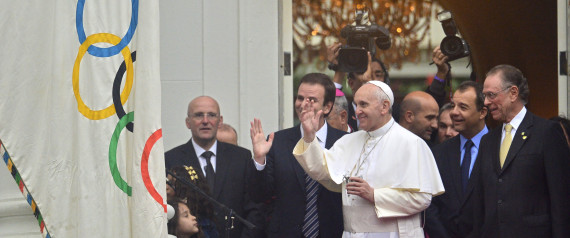This week Pope Francis will meet with Russian President Vladimir Putin at the Vatican. So, why is this meeting happening and why is it a big deal, anyway? Let’s be candid, Putin is not dropping by to borrow a cup of sugar, well possibly a metaphorical cup of sugar. A little bit of sugar to help the poison of Russia’s newest pogrom on LGBT people go down, or at least make it more palatable.
Why the urgency?
The 2014 Sochi Olympics are taking a hit.
The word “boycott” is on the lips, not only of activists, but of athletes, and consumers. Corporate sponsors are questioning consumer blowback. All this is spilling over to talks of boycotts of investment in Russia and has the potential of developing into a divestment movement like that against South Africa because of its apartheid laws in the 1980s.
Additionally, serious questions have been raised about how participants and visitors will be treated during their Olympic stay in Russia. Conditional and nuanced assurances by Russian officials have left many, as the French say: Unconvinced. Anyone with internet access can view videos of Neo-Nazis torturing gay men that they have lured into traps. In public streets and squares rightest thugs openly attack LGBT folks who attempt to engage in free public speech, or as Putin calls it “homosexual propaganda.” Wearing a rainbow could land you in the hospital, in jail or both. The police and judicial authorities turn a blind eye to these flagrant assaults and fail to prosecute thugs, who become de facto enforcers of Putin’s decrees.
Petitions have been circulated asking Nations to boycott the Olympics, comparing this Olympic event with Hitler’s hijacking of the 1936 Olympics as a propaganda device to sell the New Germany to the world. Ekaterina Samutsevich, a member of the Russian Band Pussy Riot, explains the parallel:
“In an interview with the BBC, Samutsevich said it was all but impossible for Russian athletes to mount any sort of protest as they would lose their livelihood. "[The Olympics] could be a source of national pride. But what is happening now, and there is no other way to describe it, is right-wing fascism. This is what the Olympics are turning into and even sports people are being pressured into adopting these views. Rather than celebrating about sporting achievement it becomes about propagating these views.”
Putin needs some of the heat taken off, his attempted justification that his antigay-laws are to “protect children,” although taken from the playbook of Anita Bryant and the “good” folks at the discredited National Organization for Marriage (NOM), has no foundation in reason. Putin himself said famously in his oped in NY Times "We are all different, but when we ask for the Lord’s blessings, we must not forget that God created us equal.."
This was stated, rightly, as a rebuke to President Obama’s claim of American Exceptionalism; however, doesn’t it also apply to the LGBT minority in the Russian Federation?
While the Russian Orthodox Patriarch Kirill has been very supportive of Putin, many roll their eyes, seeing Kirill, the Russian Church and Media, as being merely a rubber stamp of the regime. Where to turn?
The answer came in the mail on September 4th 2013. A letter from Francis to Putin praising him for his new role as President of the G-20, in Francis’ words:
“I am aware that the Russian Federation has participated in this group from the moment of its inception and has always had a positive role to play in the promotion of good governance of the world’s finances, which have been deeply affected by the crisis of 2008.”
Francis’ letter to Putin goes on to encourage Putin’s role as “Peacemaker” in Syria. Although not stated explicitly, it implies a role for Putin as a counterbalance to the U.S. in Middle East politics. It is all very sweet and could signal a honeymoon between the Vatican and the Russian Orthodox Church. Consider that it has only been four years since diplomatic ties with Russia and the Vatican have been reestablished after centuries of distance and cold distrust. Both Russia and the Vatican desperately need to refocus on new issues, to “change the subject” of the conversation. This meeting allows both of them to accomplish this effectively. The cost, spiritually and in terms of justice, are LGBT people and their lives.
With Syria, the Middle East and Russian relations on the table, will Pope Francis speak up on behalf of LGBT victims, or will their continuing persecution be seen as the price of a sweet deal? Perhaps Francis could simply smile, if the subject is raised by a pesky reporter, and ask: “Who am I to judge?”

